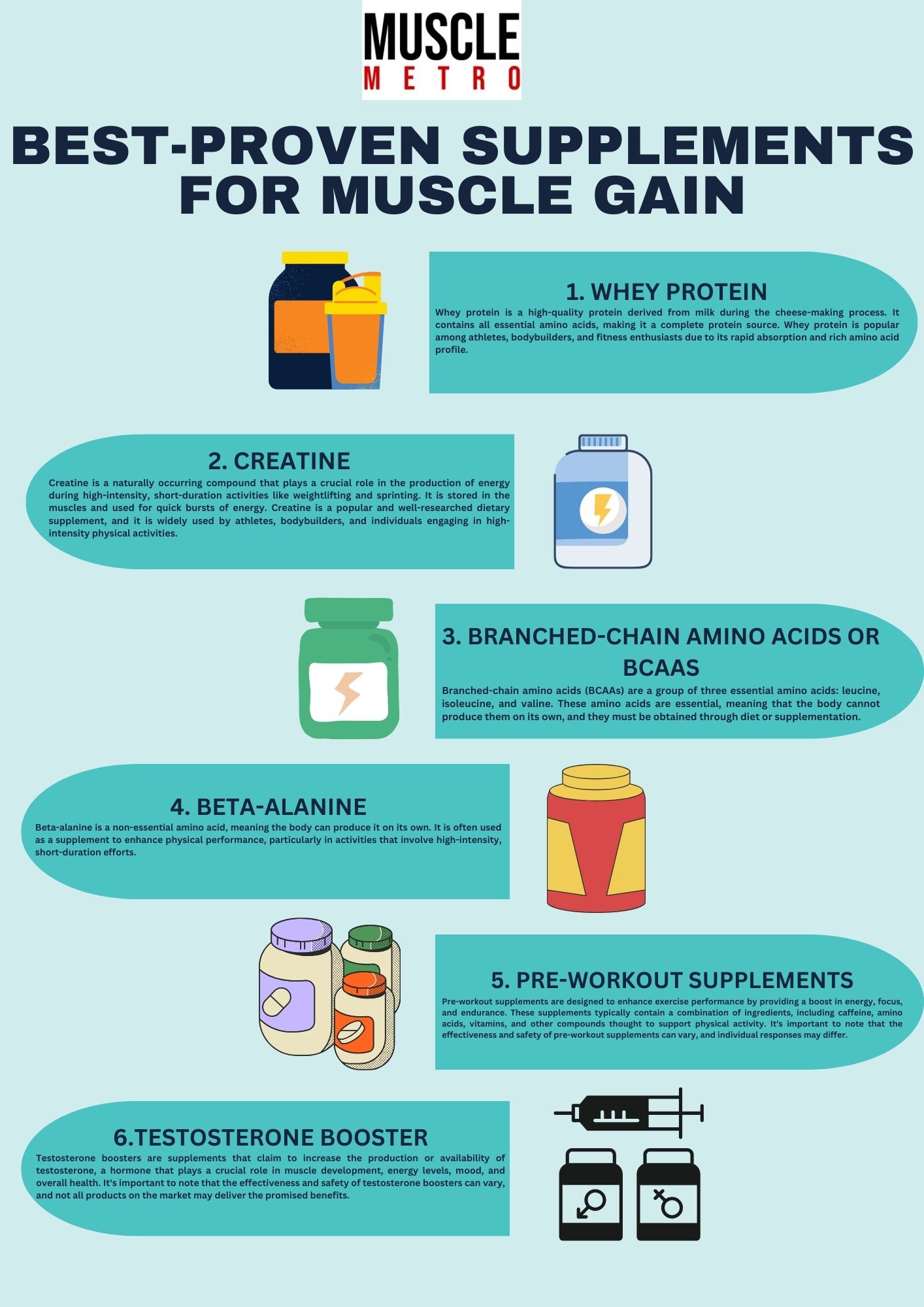How To Take Supplements For Muscle-Building?
In an era of optimal muscle gain, major individuals opt to take supplements to support their workout efforts. These supplements for building muscle fast are undeniably helpful in achieving quicker results along with enhanced performance, and improved body recovery. However, it is vital to be careful while navigating this landscape as neither are all bodies the same nor are the supplements. Let us understand the best-proven supplements for muscle gain their benefits and their risks:

1. Whey Protein
whey protein supplements for muscle gain are one of the most popular and widely used supplements in the world of fitness. It is quite rich in essential amino acids therefore becoming an excellent choice supportive of muscle growth and repair, especially after workouts. Whey protein is rapidly absorbed by our bodies therefore making a way for a quick influx of amino acids that are helpful in muscle recovery.
- Benefits: Whey proteins help in muscle development and are easily digestible by the majority of fitness enthusiasts making it the most convenient supplement to be added to meals or shakes.
Risks: While whey protein is usually safe for most individuals, excessive consumption of the supplements also leads to digestive discomfort or long-term consumption can also strain the kidneys.
2. Creatine
Creatine is a naturally occurring compound that is found in meager amounts in specific foods and is then produced by the body. It is known for supplying energy to our body, especially during short bursts of intense activity. The supplementation of creatine helps increase muscle cell volume along with strength and boosts exercise performance.
- Benefits: Extremely helpful in adding up strength, especially during resistance training and high-intensity and explosive activities.
- Risks: Improper use or excessive dosage of creatine leads to gastronomical distress, dehydration, kidney strain, and much more.
3. Branched-chain amino acids or BCAAs
BCAAs are usually comprised of three essential acids namely leucine, isoleucine, and valine. These acids are promoters of protein synthesis, reduce muscle protein breakdown, and impactfully decrease muscle soreness. These are usually taken before or during the workout sessions and pump up the muscles with a direct source of energy.
- Benefits: BCAAs are majorly beneficial during exercise sessions which further help in the prevention of muscle breakdown and improve endurance. They are also recommended for individuals that follow a calorie-restricted diet.
- Risks: BCAA supplements are safe when consumed in proper amounts; however, solely relying on BCAAs and neglecting complete protein sources is disadvantageous.
4. Beta-Alanine
Beta-alanine is an amino acid that is a combination of other amino acids, histidine, to form carnosine which plays an important role in reducing muscle fatigue during high-intensity activities that buffer acid buildup in muscles, These are also helpful in enhancing muscle endurance and delaying the onset of fatigue.
- Benefits: Beta-alanine can be beneficial for activities that include high-intensity efforts like weightlifting or sprinting and help individuals go through the training phases.
- Risks: Many individuals might feel a harmless and temporary tingling sensation known as the “paresthesia” after the consumption of beta-alanine.
5. Pre-workout supplements
Pre-workout supplements are a combination of caffeine, amino acids, and vitamins which are majorly used to improve energy, focus, and performance.
- Benefits: Pre-workouts help provide a quick energy boost while improving mental alertness which is therefore beneficial for intense training workouts.
- Risks: Caffeine content in pre-workouts leads to jitteriness, improved heart rate, and disturbed sleep patterns. Moreover, some pre-workouts may also be proprietary blends which makes them difficult to be consumed in particular dosage amounts.
6. Testosterone Boosters
These are the supplements claiming to improve the body’s natural production of testosterone which is an important hormone for crucial muscle growth; However, their efficacy is largely debated while their potential risks should not be ignored.
- Benefits: Testosterone is an effective supplement to increase muscle mass, strength, and overall performance.
- Risks: The use of testosterone boosters leads to hormonal imbalances along with various health issues therefore making it important to consult a healthcare professional before consuming such supplements.
Conclusion
While supplements are important in muscle gain and improving workout performances, they need to be approached with careful consideration. A balanced diet is a composition of nutrients making the foundation of our nutritional strategy. Before any addition of the supplements, it is important to consult a healthcare professional to ensure that the supplements are in alignment with our goals and overall health.
Frequently Asked Questions:
How to Take Supplements For Building Muscle Fast?
Here are some supplements that are commonly considered for muscle building:
- Protein Supplements:
- Whey Protein: Whey protein is a fast-digesting protein source that can be consumed before or after workouts to support muscle protein synthesis.
- Plant-Based Proteins: For those following a vegetarian or vegan diet, plant-based protein supplements (pea protein, rice protein, hemp protein) are available.
- Creatine:
- Creatine is a naturally occurring compound that helps provide energy for high-intensity activities. It can support strength training and muscle recovery. Creatine monohydrate is a commonly used form.
Can you build muscle with just supplements?
Building muscle primarily requires a combination of resistance training, proper nutrition, and sufficient rest. While supplements can play a supportive role in a muscle-building regimen, they cannot replace the foundational elements of a well-rounded exercise and diet plan. Here’s why:
- Resistance Training:
- Essential Component: Progressive resistance training, such as weightlifting or bodyweight exercises, is a fundamental element for building muscle. Supplements alone cannot stimulate the necessary muscle adaptations that result from resistance training.
- Protein Synthesis:
- Protein Intake from Whole Foods: Protein is crucial for muscle growth, repair, and maintenance. While protein supplements can be convenient, it’s important to derive the majority of protein from whole food sources.
- Nutrient Diversity:
- Essential Nutrients: Muscle growth requires a variety of nutrients, including carbohydrates, fats, vitamins, and minerals.

